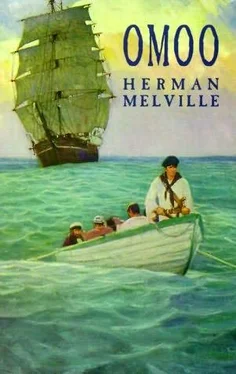Herman Melville - Omoo - Adventures in the South Seas
Здесь есть возможность читать онлайн «Herman Melville - Omoo - Adventures in the South Seas» весь текст электронной книги совершенно бесплатно (целиком полную версию без сокращений). В некоторых случаях можно слушать аудио, скачать через торрент в формате fb2 и присутствует краткое содержание. Жанр: Классическая проза, на английском языке. Описание произведения, (предисловие) а так же отзывы посетителей доступны на портале библиотеки ЛибКат.
- Название:Omoo: Adventures in the South Seas
- Автор:
- Жанр:
- Год:неизвестен
- ISBN:нет данных
- Рейтинг книги:3 / 5. Голосов: 1
-
Избранное:Добавить в избранное
- Отзывы:
-
Ваша оценка:
- 60
- 1
- 2
- 3
- 4
- 5
Omoo: Adventures in the South Seas: краткое содержание, описание и аннотация
Предлагаем к чтению аннотацию, описание, краткое содержание или предисловие (зависит от того, что написал сам автор книги «Omoo: Adventures in the South Seas»). Если вы не нашли необходимую информацию о книге — напишите в комментариях, мы постараемся отыскать её.
Omoo: Adventures in the South Seas — читать онлайн бесплатно полную книгу (весь текст) целиком
Ниже представлен текст книги, разбитый по страницам. Система сохранения места последней прочитанной страницы, позволяет с удобством читать онлайн бесплатно книгу «Omoo: Adventures in the South Seas», без необходимости каждый раз заново искать на чём Вы остановились. Поставьте закладку, и сможете в любой момент перейти на страницу, на которой закончили чтение.
Интервал:
Закладка:
As Bob was a rare one every way, I must give some account of him. There was a good deal of "personal appearance" about him; in short, he was a corpulent giant, over six feet in height, and literally as big round as a hogshead. The enormous bulk of some of the Tahitians has been frequently spoken of by voyagers.
Beside being the English consul's jailer, as it were, he carried on a little Tahitian farming; that is to say, he owned several groves of the bread-fruit and palm, and never hindered their growing. Close by was a «taro» patch of his which he occasionally visited.
Bob seldom disposed of the produce of his lands; it was all needed for domestic consumption. Indeed, for gormandizing, I would have matched him against any three common-council men at a civic feast.
A friend of Bob's told me that, owing to his voraciousness, his visits to other parts of the island were much dreaded; for, according to Tahitian customs, hospitality without charge is enjoined upon everyone; and though it is reciprocal in most cases, in Bob's it was almost out of the question. The damage done to a native larder in one of his morning calls was more than could be made good by his entertainer's spending the holidays with them.
The old man, as I have hinted, had, once upon a time, been a cruise or two in a whaling-vessel; and, therefore, he prided himself upon his English. Having acquired what he knew of it in the forecastle, he talked little else than sailor phrases, which sounded whimsically enough.
I asked him one day how old he was. "Olee?" he exclaimed, looking very profound in consequence of thoroughly understanding so subtile a question-"Oh! very olee-'tousand 'ear-more-big man when Capin Tootee (Captain Cook) heavey in sight." (In sea parlance, came into view.)
This was a thing impossible; but adapting my discourse to the man, I rejoined-"Ah! you see Capin Tootee-well, how you like him?"
"Oh! he maitai: (good) friend of me, and know my wife."
On my assuring him strongly that he could not have been born at the time, he explained himself by saying that he was speaking of his father, all the while. This, indeed, might very well have been.
It is a curious fact that all these people, young and old, will tell you that they have enjoyed the honour of a personal acquaintance with the great navigator; and if you listen to them, they will go on and tell anecdotes without end. This springs from nothing but their great desire to please; well knowing that a more agreeable topic for a white man could not be selected. As for the anachronism of the thing, they seem to have no idea of it: days and years are all the same to them.
After our sunrise bath, Bob once more placed us in the stocks, almost moved to tears at subjecting us to so great a hardship; but he could not treat us otherwise, he said, on pain of the consul's displeasure. How long we were to be confined, he did not know; nor what was to be done with us in the end.
As noon advanced, and no signs of a meal were visible, someone inquired whether we were to be boarded, as well as lodged, at the Hotel de Calabooza?
"Vast heavey" (avast heaving, or wait a bit)-said Bob-"kow-kow" (food) "come ship by by."
And, sure enough, along comes Rope Tarn with a wooden bucket of the Julia's villainous biscuit. With a grin, he said it was a present from Wilson: it was all we were to get that day. A great cry was now raised; and well was it for the land-lubber that lie had a pair of legs, and the men could not use theirs. One and all, we resolved not to touch the bread, come what come might; and so we told the natives.
Being extravagantly fond of ship-biscuit-the harder the better-they were quite overjoyed; and offered to give us, every day, a small quantity of baked bread-fruit and Indian turnip in exchange for the bread. This we agreed to; and every morning afterward, when the bucket came, its contents were at once handed over to Bob and his friends, who never ceased munching until nightfall.
Our exceedingly frugal meal of bread-fruit over, Captain Bob waddled up to us with a couple of long poles hooked at one end, and several large baskets of woven cocoa-nut branches.
Not far off was an extensive grove of orange-trees in full bearing; and myself and another were selected to go with him, and gather a supply for the party. When we went in among the trees, the sumptuousness of the orchard was unlike anything I had ever seen; while the fragrance shaken from the gently waving boughs regaled our senses most delightfully.
In many places the trees formed a dense shade, spreading overhead a dark, rustling vault, groined with boughs, and studded here and there with the ripened spheres, like gilded balls. In several places, the overladen branches were borne to the earth, hiding the trunk in a tent of foliage. Once fairly in the grove, we could see nothing else; it was oranges all round.
To preserve the fruit from bruising, Bob, hooking the twigs with his pole, let them fall into his basket. But this would not do for us. Seizing hold of a bough, we brought such a shower to the ground that our old friend was fain to run from under. Heedless of remonstrance, we then reclined in the shade, and feasted to our heart's content. Heaping up the baskets afterwards, we returned to our comrades, by whom our arrival was hailed with loud plaudits; and in a marvellously short time, nothing was left of the oranges we brought but the rinds.
While inmates of the Calabooza, we had as much of the fruit as we wanted; and to this cause, and others that might be mentioned, may be ascribed the speedy restoration of our sick to comparative health.
The orange of Tahiti is delicious-small and sweet, with a thin, dry rind. Though now abounding, it was unknown before Cook's time, to whom the natives are indebted for so great a blessing. He likewise introduced several other kinds of fruit; among these were the fig, pineapple, and lemon, now seldom met with. The lime still grows, and some of the poorer natives express the juice to sell to the shipping. It is highly valued as an anti-scorbutic. Nor was the variety of foreign fruits and vegetables which were introduced the only benefit conferred by the first visitors to the Society group. Cattle and sheep were left at various places. More of them anon.
Thus, after all that of late years has been done for these islanders, Cook and Vancouver may, in one sense at least, be considered their greatest benefactors.
CHAPTER XXXII
PROCEEDINGS OF THE FRENCH AT TAHITI
AS I happened to arrive at the island at a very interesting period in its political affairs, it may be well to give some little account here of the proceedings of the French, by way of episode to the narrative. My information was obtained at the time from the general reports then rife among the natives, as well as from what I learned upon a subsequent visit, and reliable accounts which I have seen since reaching home.
It seems that for some time back the French had been making repeated ineffectual attempts to plant a Roman Catholic mission here. But, invariably treated with contumely, they sometimes met with open violence; and, in every case, those directly concerned in the enterprise were ultimately forced to depart. In one instance, two priests, Laval and Caset, after enduring a series of persecutions, were set upon by the natives, maltreated, and finally carried aboard a small trading schooner, which eventually put them ashore at Wallis' island-a savage place-some two thousand miles to the westward.
Now, that the resident English missionaries authorized the banishment of these priests is a fact undenied by themselves. I was also repeatedly informed that by their inflammatory harangues they instigated the riots which preceded the sailing of the schooner. At all events, it is certain that their unbounded influence with the natives would easily have enabled them to prevent everything that took place on this occasion, had they felt so inclined.
Читать дальшеИнтервал:
Закладка:
Похожие книги на «Omoo: Adventures in the South Seas»
Представляем Вашему вниманию похожие книги на «Omoo: Adventures in the South Seas» списком для выбора. Мы отобрали схожую по названию и смыслу литературу в надежде предоставить читателям больше вариантов отыскать новые, интересные, ещё непрочитанные произведения.
Обсуждение, отзывы о книге «Omoo: Adventures in the South Seas» и просто собственные мнения читателей. Оставьте ваши комментарии, напишите, что Вы думаете о произведении, его смысле или главных героях. Укажите что конкретно понравилось, а что нет, и почему Вы так считаете.












